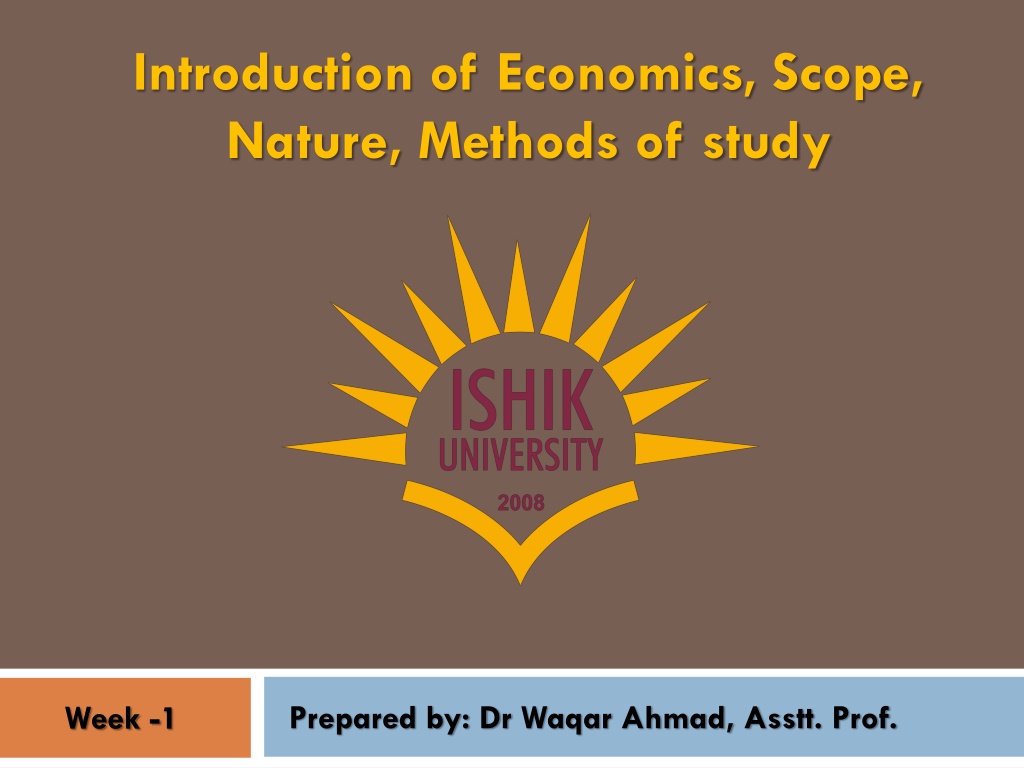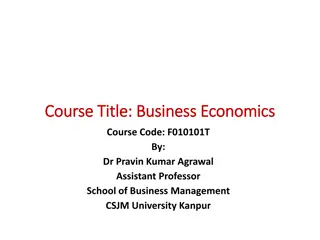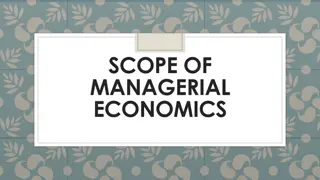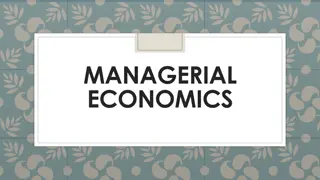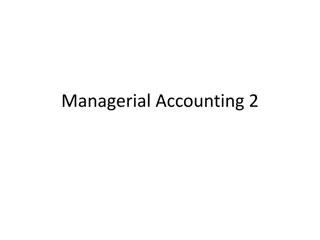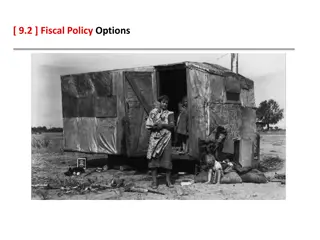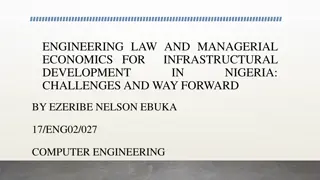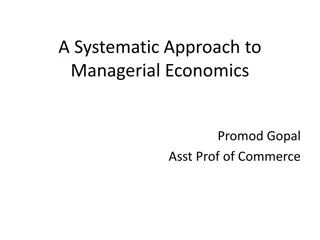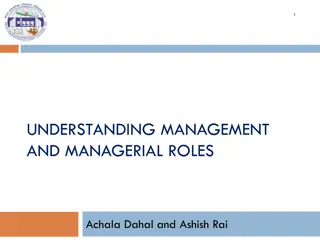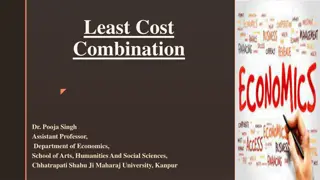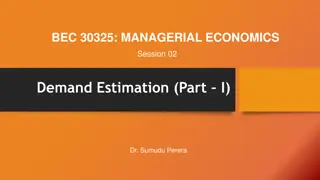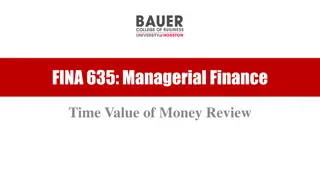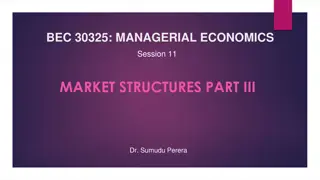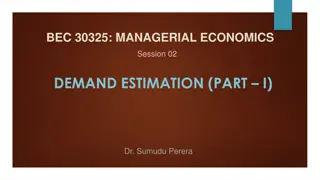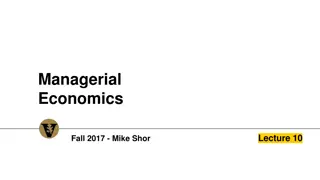Economics: Basics and Managerial Insights
This content delves into the fundamentals of economics, focusing on scarcity, efficiency, microeconomics, and managerial economics. It explains how society allocates resources to produce and distribute goods, emphasizing the challenges of scarcity. The study material also explores the relationship between economics and management.
Download Presentation

Please find below an Image/Link to download the presentation.
The content on the website is provided AS IS for your information and personal use only. It may not be sold, licensed, or shared on other websites without obtaining consent from the author.If you encounter any issues during the download, it is possible that the publisher has removed the file from their server.
You are allowed to download the files provided on this website for personal or commercial use, subject to the condition that they are used lawfully. All files are the property of their respective owners.
The content on the website is provided AS IS for your information and personal use only. It may not be sold, licensed, or shared on other websites without obtaining consent from the author.
E N D
Presentation Transcript
Introduction of Economics, Scope, Nature, Methods of study Prepared by: Dr Waqar Ahmad, Asstt. Prof. Week -1
Learning Objectives 1. What is Economics? 2. What is managerial Economics? 3. To analyze the concept of economics- scarcity and efficiency? 4. Micro Economics and macro economics? 5. What are the Concept of managerial economics? 6. How managerial economics differ from economics and its relationship with management ? Managerial Economics Pearson and Lewis, Prentice Hall Week-1
This unit introduces you to the basic concepts of Economics. After going through this unit you will come to know how Economics is helpful for Managers in their Decision making process. The basic purpose of our studying of economics are the efficient utilization of scarce resources. We always have to make choices amongst various alternatives available for efficient utilization of our scarce resources. The twin theme of economics is scarcity and efficiency. We will discuss this twin theme in detail before coming to managerial economics.
Overview The basic purpose of our studying of economics are the efficient utilization of scarce resources. We always have to make choices amongst various alternatives available for efficient utilization of our scarce resources. The twin theme of economics is scarcity and efficiency. We will discuss this twin theme in detail before coming to managerial economics.
Overview Cont. Scarcity and Efficiency: The first question which comes here is what is Economics? Economics is the study of how society chooses to use productive resources that have alternative uses, to produce commodities of various kinds, and to distribute them among different groups. Two key ideas in economics: Scarcity of goods Efficient use of resources
Overview Cont. Scarcity of goods The word scarce is closely associated with the word limited or economic as opposed to unlimited or free. Scarcity is the central problem of every society. Concept lies at the problem of resource allocation and problem of a business enterprise. The essence of any economic problem, micro or macro, is the scarcity of resources. The managers who decide on behalf of the corporate unit or the national economy always face the economic problem of Scarcity of good quality of materials or skilled technicians.
Overview Cont. As a Marketing Manager As a Finance Manager As a Finance Minister of the Country Unemployment: Scarcity of jobs Unsold stock of inventory: Scarcity of buyers Under utilized capacity of plan: Scarcity of power or other support facilities. Had there been no scarcities there would not have been any managerial problem. It is only because of this scarcity a manager has to decide on optimum allocation of scarce resources of: 1. Man 2. Materials 3. Money 4. Time 5. Energy
Overview Cont. Thus we see that every business unit or manager must aim at rational but optimum allocation of scarce resources. Optimality lies in finding the best use of scarce resources, given to the constraints.
Overview Cont. Economics provide optimum utilization of scarce resources to achieve the desired result. It provides the basis for decision making. Economics can be studied under two heads: 1. Micro Economics 2. Macro Economics
Overview Cont. Micro Economics: It has been defined as that branch where the unit of study is an individual, firm or household. It studies how individual make their choices about what to produce, how to produce, and for whom to produce, and what price to charge. It is also known as the price theory and is the main source of concepts and analytical tools for managerial decision making. Various micro-economic concepts such as demand, supply, elasticity of demand and supply, marginal cost, various market forms, etc. are of great significance to managerial economics.
Overview Cont. Macro Economics: It s not only individuals and forms that are faced with having to make choices. Governments face many such problems. For e.g. How much to spend on health; How much to spend on services; How much should go in to providing social security benefits. This is the same type of problem faced by all of us in our daily lives but in different scales. It studies the economics as a whole. It is aggregative in character and takes the entire economy as a unit of study. Macro economics helps in the area of forecasting. It includes National Income, aggregate consumption, investments, employment etc.
Overview Cont. Following are the various economic concepts which are useful for managers for decision making: 1. Demand theory 2. Elasticity 3. Price elasticity of demand and supply 4. Income elasticity of demand and supply 5. Market Structure and price discrimination 6. Opportunity cost 7. Pricing strategy 8. Marginal revenue product 9. Production function
Overview Cont. Following are the various economic concepts which are useful for managers for decision making: 10. Theory of firm: price, output and investment decisions 11. National income 12. Business cycle 13. Profit 14. Risk and uncertainty theories
Introduction to Managerial Economics In the words of Mc Nair and Merriam, "Managerial Economics consist of use of economic modes of thought to analyze business situation . According to Spencer and Seigelman it is defined as the Integration of economic theory with business practice for the purpose of facilitating decision making and forward planning by the management
Introduction to Managerial Economics Managerial Economics = Management + Economics What do you mean by Decision Making?
Introduction to Managerial Economics Decision making is the most important function of business managers. Decision making is the central objective of Managerial Economics. Decision making may be defined as the process of selecting the suitable action from among several alternative courses of action. The problem of decision making arises whenever a number of alternatives are available. Such as:
Introduction to Managerial Economics What should be the price of the product? What should be the size of the plant to be installed? How many workers should be employed? What kind of training should be imparted to them? What is the optimal level of inventories of finished products, raw material, spare parts, etc.?
Introduction to Managerial Economics Now we will discuss various aspects relating to the management decision making or Managerial Decision Making. What Is Management? ?Management is the process of coordinating people and other resources to achieve the goals of the organization ? .Most organizations use various kinds of resources. Basic Management Functions A number of management functions must be performed if any organization is to succeed. ? Establishing Goals and Objectives. ? Establishing Plans to Accomplish Goals and Objectives. ? Organizing the Enterprise. Leading and Motivating ? Controlling Ongoing Activities.
Introduction to Managerial Economics Kinds of Managers They can be classified along two dimensions: ? Level within the organization which include: Top managers; Middle Managers; First Line Managers. ? Area of management which include: Financial Managers; Operations Managers; Marketing Managers; Human Resources Managers; Administrative Managers.
Introduction to Managerial Economics What Makes Effective Managers? Key Management Skills. The skills that typify effective managers tend to fall into three categories. ? Technical Skills ? Conceptual Skills. ? Interpersonal Skills. ? Managerial Roles. ? Decisional Roles ? Interpersonal Roles ? Informational Roles.
Introduction to Managerial Economics Managerial Decision Making Decision-making is the act of choosing one alternative from among a set of alternatives. Managerial decision making involves four steps. ? Identifying the Problem or Opportunity ? Generating Alternatives. ? Selecting an Alternative ? Implementing and Evaluating the Solution
Scope of Managerial Economics 1. Demand forecasting 2. Production function 3. Cost analysis 4. Inventory management 5. Advertising 6. Pricing system 7. Resource allocation Managerial economics aims at providing help in decision making by firms. It is heavily dependent on microeconomic theory. The various concepts of micro economics used frequently in managerial economics include Elasticity of demand; Marginal cost; Marginal revenue and Market structures and their significance in pricing policies
Relationship between Managerial Economics and other Subjects 1. Economics 2. Mathematics 3. Statistics 4. Accounting 5. Operation Research 6. Computers 7. Management
Tools and Techniques in Decision Making Economic theory offers a variety of concepts and analytical tools which can be of considerable assistance to the managers in his decision making practice. These tools are taken as guide in making decision. Following are the basic economic tools for decision making: 1. Opportunity cost principle 2. Incremental principle 3. Principle of the time perspective 4. Discounting principle 5. Equi-marginal principle.
Tools and Techniques in Decision Making Opportunity Cost principles A decision is the sacrifice of alternatives required by that decision; Opportunity Cost represents the benefits or revenue forgone by pursuing one course of action rather than another; Opportunity Cost are not recorded in the accounting records of the firm, but have to be met if the firm aims at optimization. Opportunity Cost is always higher to Accounting Costs When ever a manager takes or makes a decision, he chooses one course of action, sacrificing the other alternatives.
Tools and Techniques in Decision Making Incremental Principle It is related to the marginal cost and marginal revenues, for economic theory. Incremental concept involves estimating the impact of decision alternatives on costs and revenue, emphasizing the changes in total cost and total revenue resulting from changes in prices, products, procedures, investments or whatever may be at stake in the decisions. The two basic components of incremental reasoning are Incremental cost Incremental Revenue
Tools and Techniques in Decision Making Principle of Time Perspective The very important problem in decision making is to maintain the right balance between the long run and short run considerations. Decision making is the task of co-coordinating along the time scale- past, present and future. Discounting Principle Discounting is both a concept as well as technique borrowed from accountancy. For explanation readopt the opportunity and time perspective. Consider the case of the seller. The seller has to decide between the immediate cash payment of Rs. 1000 by his customer and the future payment of say Rs. 1100 at the end of one year from now.
Tools and Techniques in Decision Making Marginal Principle: Due to scarce resources at the disposable, the manager has to be careful of spending each and every additional unit of resources. In order to decide whether to use an additional man hour or machine hour or not you need to know the additional output expected from there. A decision about additional investment has to be viewed in terms of additional returns from the investment. Economists use the word Marginal for additional magnitudes of production or return. Economist often use the terms like
Tools and Techniques in Decision Making Marginal output of labor Marginal output of machine Marginal return on investment Marginal revenue of output sold Marginal cost of production Marginal utility of consumption
Questions 1. What is the meaning of managerial economics? 2. What do you mean by decision Making? 3. Explain the Nature and Scope of Managerial Economics? 4. Give the relation between Managerial economics and other fields of study. 5. Give a detailed account on the tools and techniques of decision making.
